“If you then…know how to give good gifts to your children, how much more will the Father in heaven give the holy Spirit to those who ask him?” (Lk 11:13)
The Day of Pentecost is often referred to as the birthday of the Church and with good reason. It was the birth of something totally new in the world, but something that at the same time was an old reality.
To put this in context, let me explain a few dynamics of what happened on Pentecost so we can understand the true miracle – the new birth – that came upon the world on that holy day.

First Dynamic: Unity
Scripture testifies that representatives from all the nations of the ancient world were present with the disciples in Jerusalem on that day (Acts 2:8-11). The key point is that the coming of the Holy Spirit literally fused them all into one very large and diverse community, not related by blood but bound by spiritual ties.
The fracturing of the human family that occurred at the Tower of Babel (Gen 11:1-9) was instantly reversed on Pentecost. Everyone there heard the apostles speaking in their own languages, or understood them regardless of the languages spoken. Scattered humanity was suddenly one again because of the giving of the Holy Spirit.
Second Dynamic: Spiritual Power
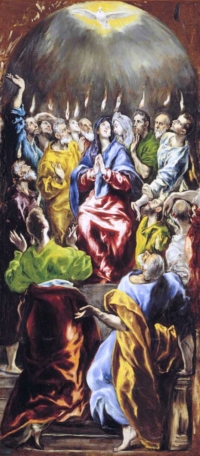 Likewise, because of the Spirit, the Church became equipped by grace to carry out its divine mission of baptizing and evangelizing the entire world. Jesus defined that mission for the Apostles before He ascended into heaven (Mt 28:20), but He left it to the Holy Spirit to endow them with the “power from on high” (Lk 24:49) to carry it out.
Likewise, because of the Spirit, the Church became equipped by grace to carry out its divine mission of baptizing and evangelizing the entire world. Jesus defined that mission for the Apostles before He ascended into heaven (Mt 28:20), but He left it to the Holy Spirit to endow them with the “power from on high” (Lk 24:49) to carry it out.
And since this mission is humanly impossible to accomplish, this power took the form of spiritual gifts, which are divine in origin and not mere human talents. The Church understood these gifts as having been predicted centuries earlier by the prophet Isaiah (Is 11:2) as signs or powers of the coming Messiah:
Wisdom | Understanding | Knowledge | Counsel | Piety | Fear of the Lord | Fortitude
In essence, the Holy Spirit Himself is the gift, a seven-fold gift of spiritual blessings for all believers. And of course, we always give gifts on birthdays, don’t we? So does God!
The beautiful ancient sequence the Church sings on Pentecost Sunday expresses our petitions and sentiments well:
Da tuis fidelibus / Thou, on those who evermore
In te confidentibus / Thee confess and Thee adore,
Sacrum septinarium / In Thy seven-fold gifts descend.

Third Dynamic: Divine Light and Life
The Spanish language has a beautiful term to speak about the wonder of giving birth. It describes it as dando a luz – that is, “giving to the light”. There is a deep truth embedded in this native wisdom.
If the birth of a child is a sort of entrance into a new world of light, Pentecost was every bit of that, and more, for the infant Church. In fact, it was a new form of existence. This
birth made the Church (as we said of Our Lady in the last newsletter), a sacred window, a permanent portal through which the Light and Life of God flows into the world. It is not just aspects of the divine (beauty, truth, goodness) that flow through the Church, it is God the Holy Spirit Himself!
What a joyful birthday gift!
The Jewish Roots of Pentecost
But the Church’s birth didn’t just happen on some arbitrary whim of God either. It was well-prepared for in the history of Israel, as are all the institutions and major practices of our Church.
To be specific, Pentecost was the birthday of the Jews before it was the birthday of the Christian Church. And we have a lot to learn from the comparison.
The name Pentecost means “fifty” in Greek. But why fifty? The Old Testament has a clear answer. The Hebrew nation celebrated a spring harvest festival each year in gratitude to Yahweh for His abundant blessings (in Hebrew, the festival is called Shavuot). It is one of the most documented feasts of the Jewish calendar, appearing in Ex 23;16; Num 28:26; Lev 23:16; and Deut 9:6, and other passages.
Yahweh decreed that the Jews were to celebrate this festival exactly seven weeks and one day after Passover, which is why it is also called the Feast of Weeks. Seven weeks of seven days is 49. The next day is 50, which is the origin of the festival’s name, Pentecost.

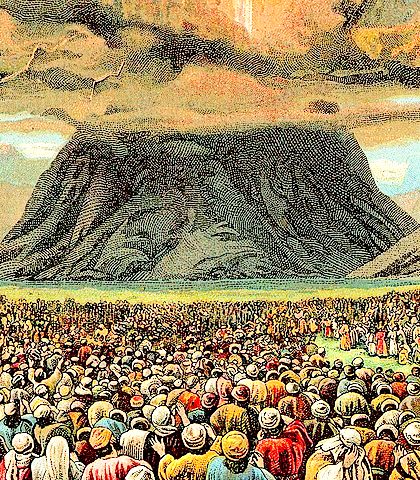
A Numbers Game
We can’t help but see in this an obvious prefigurement of God’s Plan for His Church. There are numerous biblical parallels.
In the Acts of the Apostles (1:3), for example, St. Luke says that Jesus appeared to His disciples for forty days after Easter and then ascended into heaven. Forty, of course, is a very round and significant biblical number:
- The 40 days of the Flood;
- The 40 years Israel wandered in the desert;
- The 40 days Moses and Elijah spent in fasting and prayer; and of course,
- Our Blessed Lord’s own 40 days in the desert, etc.
Then, ten days after His Ascension, the Lord sent His Spirit upon the Church: and 40 plus 10 is 50 – the Christian Pentecost!
So the parallels are pretty clear: Judaism’s Pentecost, fifty days after Passover; the Christian Pentecost, fifty days after Easter. Likewise, the Old Testament Pentecost was a festival of thanksgiving for the fruits of the earth; the New Testament Pentecost is a literal harvest of the gifts and fruits of the Holy Spirit.
Like the dates of Passover and Easter, whose celebrations often occur on the same weekend or very close to one another, the Jewish and Christian celebrations of Pentecost track one another closely each year. (In 2023, Shavuot occurs from May 25-27 and Pentecost takes place on May 27-28.)
But when the destruction of the Temple in Jerusalem (70 AD) made the harvest offerings impossible for the Jews, Pentecost came to be associated with the giving of the Covenant on Mount Sinai. This, too, was a significant preparation for the Christian Church.

An Image of the Church
It all has to do with God’s choice of a people. Prior to Sinai, the Jews were a ragtag collection of tribes (former slaves) wandering in the desert and would have had no enduring identity had it not been for the Covenant on Sinai.
Sinai was the moment when God made them into a distinct nation, a real people, endowed with a mission to save the world. He told them:
Now, if you obey me completely and keep my covenant, you will be my treasured possession among all peoples, though all the earth is mine. You will be to me a kingdom of priests, a holy nation. (Ex 19:5-6)
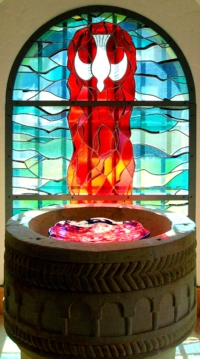 The Jews think of that moment in history as the birth of their holy nation, where God chose them and then revealed Himself to them in signs and wonders on the mountain as never before: fire, lightning and thunder, earthquake, rushing wind, even a trumpet blast! (Ex 19:16-25).
The Jews think of that moment in history as the birth of their holy nation, where God chose them and then revealed Himself to them in signs and wonders on the mountain as never before: fire, lightning and thunder, earthquake, rushing wind, even a trumpet blast! (Ex 19:16-25).
We shouldn’t wonder, then that, on the Day of Pentecost, God was doing the same thing!
The disciples, too, were a ragtag group of fishermen and random Jews gathered in Jerusalem for the festival. Here, God was choosing from His holy nation those He would endow with His gifts, and sending them out to the ends of the earth for the mission of salvation.
And clearly, the disciples were radically transformed by this event, as is evident when you compare them with what they had been previously. Before Pentecost, the disciples were cowering behind locked doors in the Upper Room, fearful of persecution. Afterward, they were fearless preachers of the New Way.
Peter’s transformation was even greater. His earlier denial of Christ and rather feeble embrace of the Resurrection showed him to be a weak disciple and leader. After Pentecost, however, he became a kind of super-apostle, preaching, healing, having mystical visions, converting others, and even raising a woman from the dead.

The World Made New
And weren’t the manifestations on Pentecost essentially the same as those on Sinai: tongues of fire, the shaking of foundations, the rushing wind, etc.? We could even stretch and say that Peter’s fierce new preaching of Christ was the trumpet blast of the new dispensation.
God revealed Himself to the disciples on Pentecost as never before because the Holy Spirit is the “Promise of the Father” (Lk 24:49) that Jesus spoke of before His Ascension. The gift of the Spirit is the ultimate fulfillment of the Covenant on Sinai.
Promises made. Promises fulfilled.
The world that had been created by the Father was made new by the Creator Spirit. St. Peter, our first pope, would later quote that passage from Exodus 19 and apply it to the Christian Church (note the addition of the message about “light”):
But you are “a chosen race, a royal priesthood, a holy nation, a people of his own, so that you may announce the praises” of him who called you out of darkness into his wonderful light. (1 Pt 2:9)
If you’re like me, you can’t help but marvel at these many parallels. Only a divine Mind, outside of time, implementing His eternal plan, could bring all these blessings together on one historical day – Pentecost.
Two birthdays, one great feast.
What a joyful celebration!
———-
[Note: This article is a reproduction of the Sacred Windows Email Newsletter of 5/28/23, so it does not end with the regular Soul Work section. Please visit our Newsletter Archives.]
Photo Credits (source: Wikimedia Commons): Nheyob (Feature: St. James the Greater Church, Concord, NC) CC BY-SA 4.0; GO69 (Banner 1: Parroquia Maria Magdalena, Madrid, Spain) CC BY-SA 4.0; Pentecost by El Greco, public domain; Nheyob (Banner 2: Christ the King Church Ann Arbor, MI) CC BY-SA 4.0; AndyScott (Banner 3: Corpus Christi Catholic Church) CC BY-SA 4.0; Zarateman (Banner 4: Parroquia Maria Magdalena, Madrid, Spain) CC0; Frank Vincentz (Baptismal Font, St. John the Baptist Church, Munster, Germany) CC BYSA 3.0.
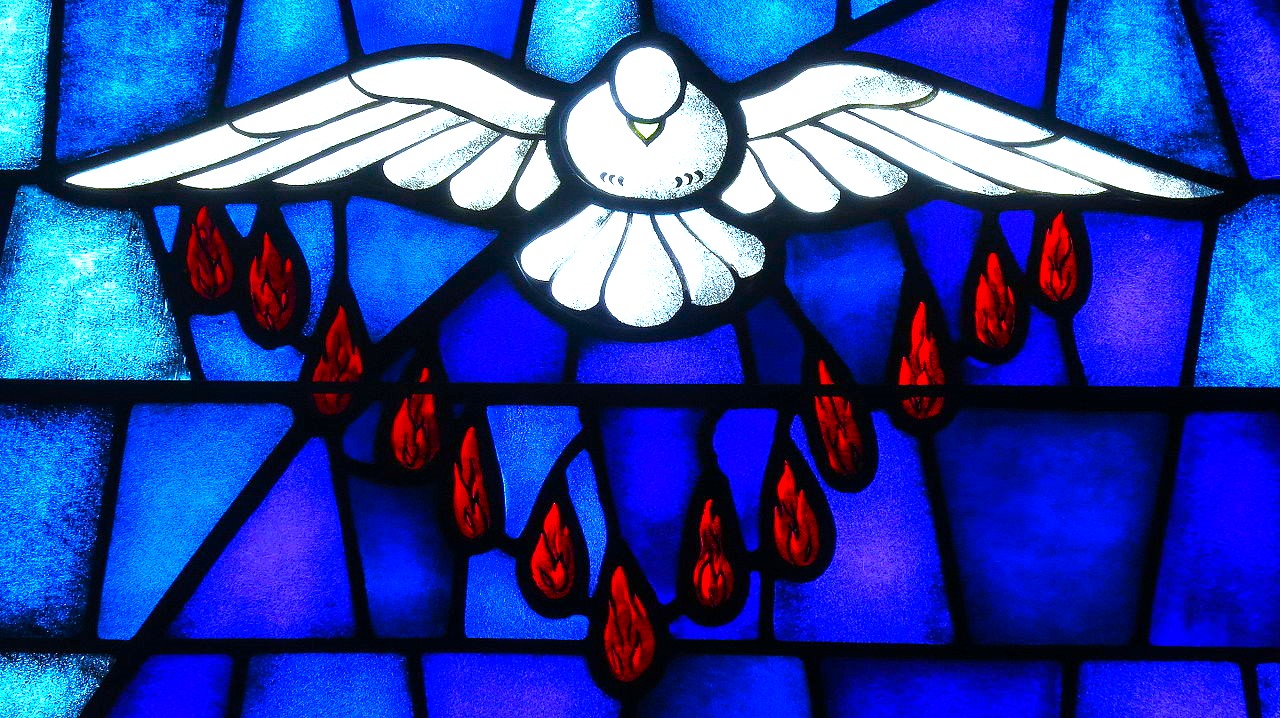
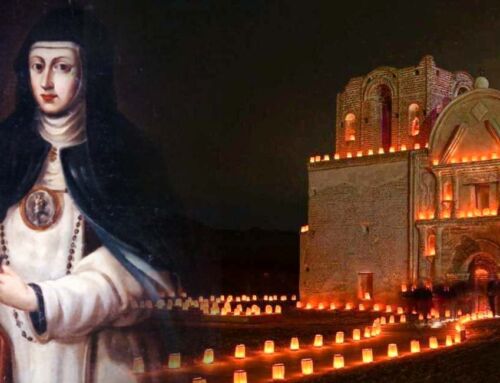

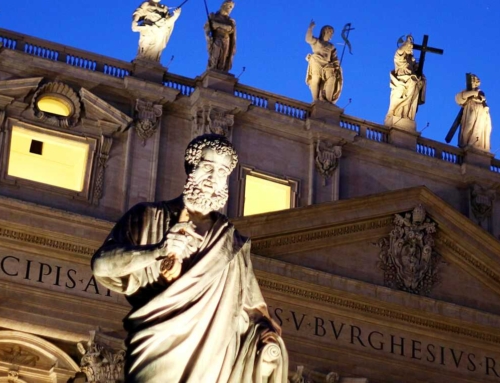
Leave A Comment